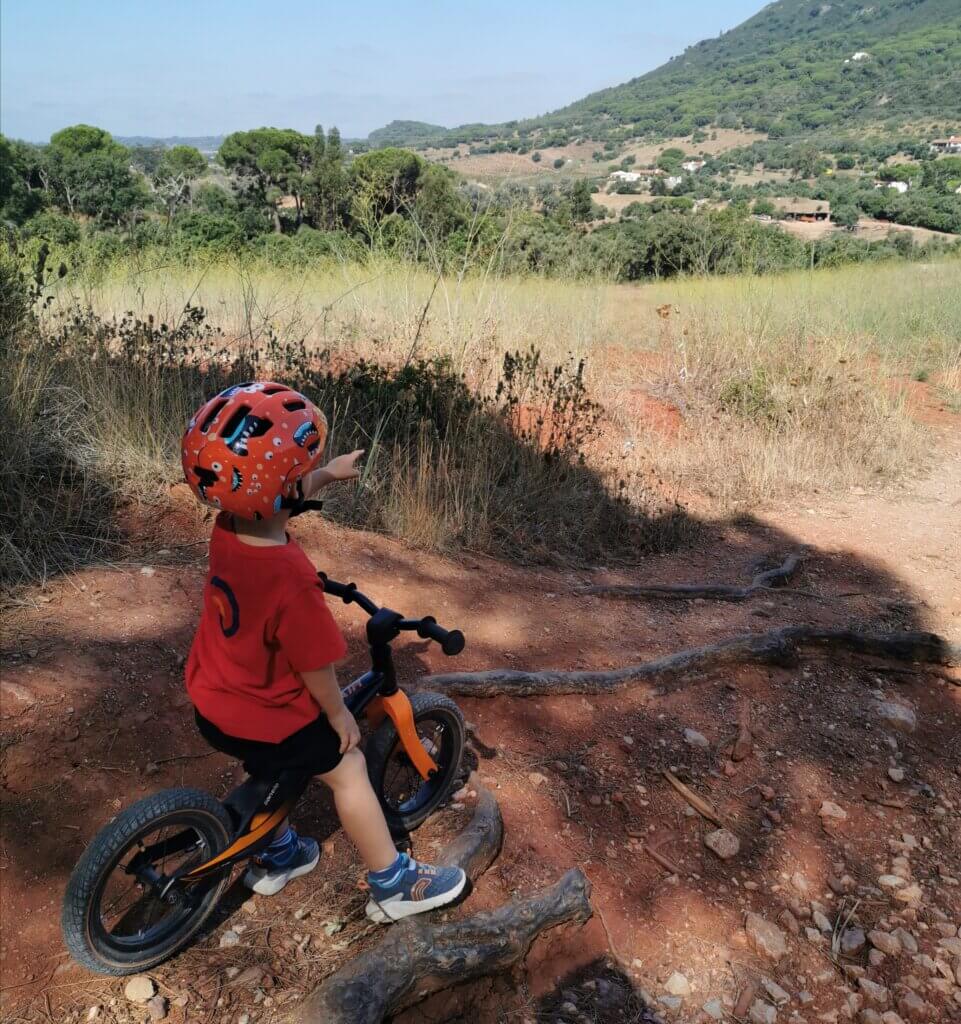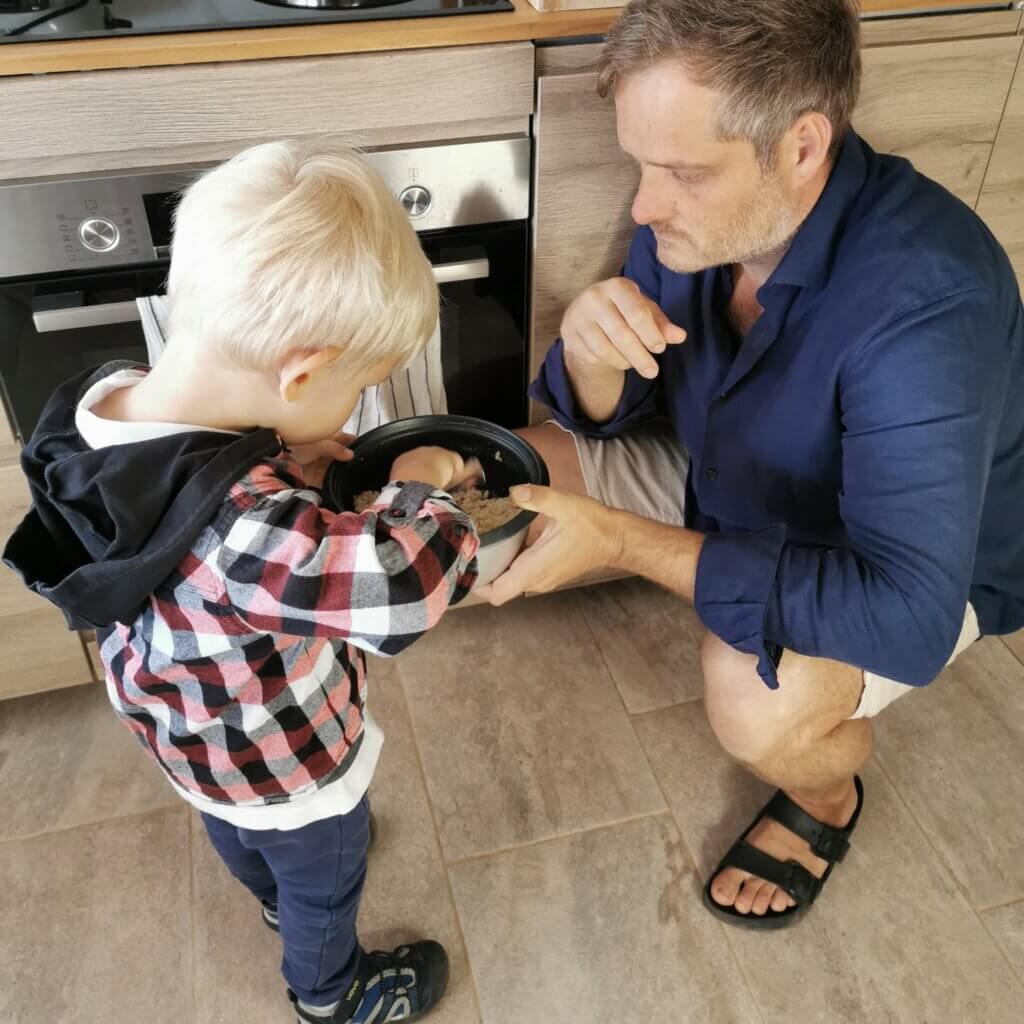EQ Ritual #3 in the 7-Way to Be 1% Happier Together
We often celebrate kids for being “well-behaved” — quiet, obedient, agreeable.
But in a world changing faster than ever, what if we focused instead on raising emotionally intelligent kids who know how to lead — not just follow?
Sometimes, leadership looks like planning.
Other times, it looks like joyfully stepping into the center of the moment, like our son did at just 15 months old during the Flower Festival in Madeira — dancing, laughing, captivating strangers with nothing but presence and play.
Leadership doesn’t begin in adulthood.
It starts when a child is trusted to choose their snack, lead a walk, ask questions, carry a plate… or dance like no one’s watching.
It starts with how we respond when something breaks — or when they do something brave.
This ritual is about creating 14 minutes of space (or more) for your child to practice agency, while knowing they’re safe, seen, and supported.
It’s where confidence grows. It’s where self-trust is built.
And it’s a key part of becoming 1% Happier Together.
What the Research Says
Daniel Goleman, in his groundbreaking book Emotional Intelligence, shared compelling evidence that EQ can be a better predictor of success than IQ — particularly when it comes to leadership, adaptability, and long-term well-being.
Goleman emphasised the importance of Social and Emotional Learning (SEL) in early childhood education and its ripple effects throughout life. One study, cited by Edutopia, found that SEL programs:
Boosted academic performance
Improved emotional regulation
Built stronger peer relationships
Created safer, more connected school cultures.
Other research confirms that children who are trusted to make decisions, express feelings, and solve problems develop higher resilience, motivation, and empathy — foundational traits of emotionally intelligent leaders.
So what does this look like at home? In your daily rhythm?
It’s not about grand speeches. It’s about the small moments we create — over and over again — where our children get to lead.
Here are 3 real-life stories you can try at home, too:

Story #1: “Where Should We Go Today?” — Walking as Leadership
When our son Rafa was about two and a half, we started going on regular walks and bike rides in the park or nearby woods. One day, I simply asked him:
“Which way should we go?”
I already knew both paths well. One was easier, one more challenging — but both safe.
I explained what he might expect, then let him choose.
And he loved it. He lit up. Not because it was easier, but because it was his decision.
That moment set a tone for us.
He didn’t need toys — the natural world was full of wonder when he felt confident leading.
I was close behind, carrying snacks (because that’s part of leadership with toddlers too!), and simply letting him enjoy the path he chose.
That’s what emotionally intelligent leadership looks like in toddlerhood:
🔹 Exploration without pressure
🔹 Supported choices
🔹 Knowing someone’s got your back
Story #2: “The Broken Plate” — Real Lessons, Real Emotions
One afternoon, Rafa wanted to help carry a plate of fruit back to the kitchen. It slipped. It cracked. He was scared.
And I felt that pause inside myself — the one between reacting and responding.
Instead of blaming him, we checked for injuries, then sat down.
We explained: some things break and cannot be repaired. That’s why we move mindfully, respect what we have, and pay attention.
Since then, he’s even more engaged in setting the table. He asks about materials. He’s curious, responsible — because the moment didn’t end with shame.
It ended with a story. With trust. With growth.
That’s what emotionally intelligent leadership looks like:
🔹 Repair over reaction
🔹 Meaning over blame
🔹 Learning from real life
Story #3: “Just a Snack Before We Go” — Leadership in Everyday Moments
At home, we’ve always trusted Rafa to know his own hunger. He has access to a drawer of snacks — dried fruit, rice waffles, nuts — and he’s learned to choose wisely without overindulging.
But toddlers aren’t always predictable — and sometimes, just as we’re walking out the door, he’s suddenly hungry again.
This photo captures one of those moments: dressed and ready to go, Pawel holding the bowl while Rafa munches on some rice — calmly, confidently, with no pressure to rush.
It’s small, but it matters.
It’s how we show him that his needs are valid, even in transition.
That food is fuel, not something to fight over.
And that asking for what you need is leadership too.
This is emotional intelligence in motion:
🔹 Honouring hunger as communication
🔹 Offering support without shame
🔹 Trusting the process, even if it takes one more minute

Ritual Practice: 14 Minutes to Let Them Lead
Here are small ways to invite leadership into your shared day — one moment at a time.
For Toddlers:
Let them choose between two options: clothes, snack, book
Ask, “Can you show me how you’d do it?”
Invite them to lead a mini-walk
For Kids:
Plan a snack together
Ask for their help deciding on a weekend activity
Let them explain something to you
For Preteens:
Have them organise a mini project (family picnic, movie night)
Journal together about a decision they made recently
Reflect: “What’s something you’re proud of leading?”
Start with 14 minutes. That’s all it takes to start building the muscle of inner leadership — one choice, one conversation, one shared moment at a time.
💬 Ritual Wrap-Up
We don’t need to wait for our children to become adults to call them leaders.
We just need to make space for them to try. To decide. To grow.
And when we show up — not with pressure, but with presence —
we create homes where leadership begins early, and emotional intelligence leads the way.
If this article resonated with you, you might also enjoy the first two rituals in the 7-Way to Be 1% Happier Together:
🟡 Ritual #1: Mindful Walking with Kids
🟠 Ritual #2: Mindful Cooking with Kids
You’ve probably heard the saying,
“It takes a village to raise a child.”
I believe it also takes intention, shared stories, and a little bit of joy every day.
So I’ve created a small, private WhatsApp community for those of us living in or around Setúbal and Lisbon. We share upcoming mindful walks with kids, other gentle rituals, and ways to connect without pressure.
🌿 If you’d like to join — just leave a comment or send me a message, and I’ll send you the link to our growing little village.
Let’s keep showing up — 1% at a time.
Because in that 1%… everything starts to change.
✨ Sharing is Caring – Click & Inspire! 🔥
📢 Loved this post? Spread the inspiration!
Click on a social icon below to share it with your friends and community.



Foarte interesant si frumos scris🥰, multe tehnici le aplicam, folosim si noi.
Nu mereu ne ies🙂🙈, dar le folosim in continuare🥰.
Ma bucur ca ți-a plăcut, Roxy! 🤗❤️Nici nouă nu ne ies mereu, dar cum spui și tu, important e sa păstrăm consistenta și sa observăm ce funcționează mai bine. Efectul se vede pe termen lung, atât cel pozitiv cât si cel negativ. Nimic nu e nou și totuși, uneori, simțim ca este ideea potrivită la momentul potrivit 😊
Tu ai deja mai multă experiență ca mine, ce alte tehnici mai folosiți pentru a le da copiilor puterea de decizie?
Pingback: Finding Flow with Kids: The 14-Minute Ritual That Lasts